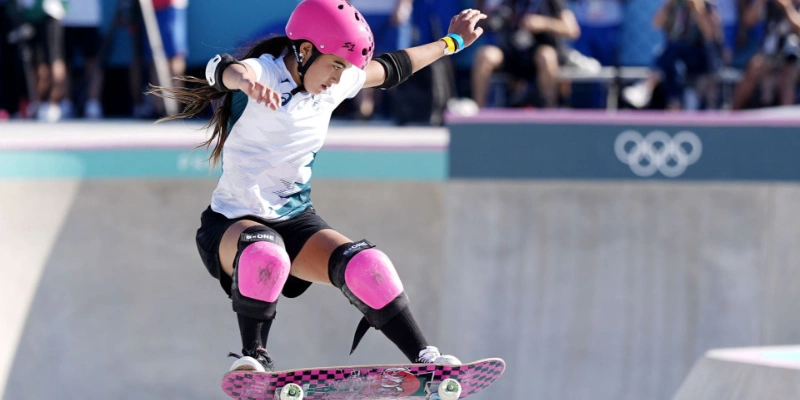Skateboarding, once seen as a rebellious street sport, made history when it officially became part of the Olympic Games. Skateboarding’s inclusion in the Olympics marked a major shift in how youth-driven, urban sports are recognised in the global sports community. The Skateboarding Olympics, introduced at the Tokyo 2020 Olympics, brought a new wave of energy, style, and inclusivity to the world’s biggest sporting stage.
The Skateboarding Olympics debut in Tokyo was more than just another event – it was a cultural milestone. For the first time, skateboarders worldwide had the chance to compete for Olympic glory while showcasing their creativity, athleticism, and passion. With events such as Street and Park, the Skateboarding Olympics showcased a unique blend of technical skill and personal expression that appealed to audiences of all ages.
In this article, we’ll take you through the top Skateboarding Olympics moments that made history. From record-breaking performances to inspiring underdog stories, you’ll discover the standout highlights that defined this new Olympic sport.
Whether you’re a lifelong skateboarding fan or a curious newcomer, this deep dive into the Skateboarding Olympics will show you why its Olympic debut was truly unforgettable.
Skateboarding debuts at the Olympics (Tokyo 2020)
Skateboarding made its historic Olympic debut at the Tokyo 2020 Summer Games, marking a significant milestone in the evolution of both the sport and the Olympic movement. After decades of success in underground scenes and X Games competitions, skateboarding finally made its way onto the world’s biggest sporting stage, bringing with it a new energy and a fresh cultural identity.
The inclusion of skateboarding was part of the International Olympic Committee’s (IOC) effort to attract a younger audience and make the Games more relevant to modern youth. By showcasing a sport deeply rooted in creativity, rebellion, and freedom of expression, the Skateboarding Olympics introduced a new atmosphere to the traditionally structured and disciplined Olympic environment.
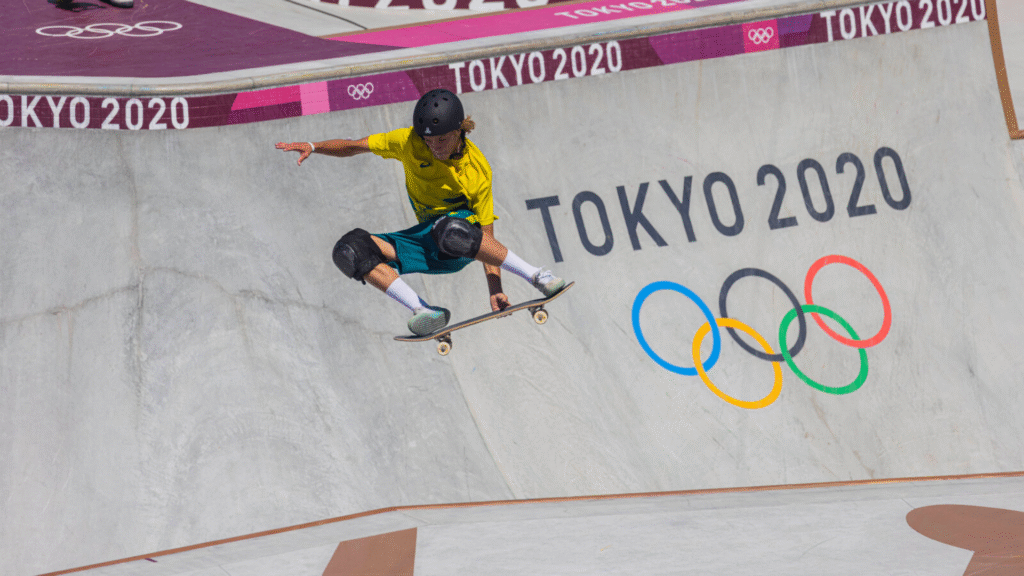
Street and Park: Two different styles, one global stage
The Skateboarding Olympics got off to an exciting start with two distinct and dynamic competition formats: street and park competitions. These categories offered a wide display of the sport’s versatility and appeal.
Street skateboarding simulated a real-world urban environment, where athletes performed tricks using elements such as stairs, railings, ledges, and benches. Competitors were judged on the technical difficulty, originally, and execution of their tricks, highlighting the sport’s fundamentals of precision and creativity.
In contrast, park skateboarding took place in a deep, vaulted space designed with pronounced curvature and fluid transitions. This configuration allowed skaters to perform high-flying tricks, emphasizing style, amplitude, and diversity of movements. The fluid nature of park racing highlighted the artistic and athletic side of skateboarding.
These two disciplines at the Skateboarding Olympics gave audiences around the world a complete view of the sport, from street-level technical mastery to aerial beauty and power. It was a true celebration of skateboarding’s diverse expressions and athletic excellence.
Cultural impact: A youth movement goes global
What made the Skateboarding Olympics truly special was their cultural impact. The event introduced a cool, expressive, and community-oriented spirit rarely seen in other Olympic sports. Athletes, many of whom were teenagers, openly supported each other, celebrated each other’s moves, and brought a sense of unity that resonated with spectators around the world.
This debut wasn’t just about medals – it was about showcasing a lifestyle and attitude that transcends borders. The Olympic spotlight helped skateboarding gain mainstream recognition while still staying true to its roots, inspiring a new generation of skaters and opening the door for the sport’s global acceptance and growth.
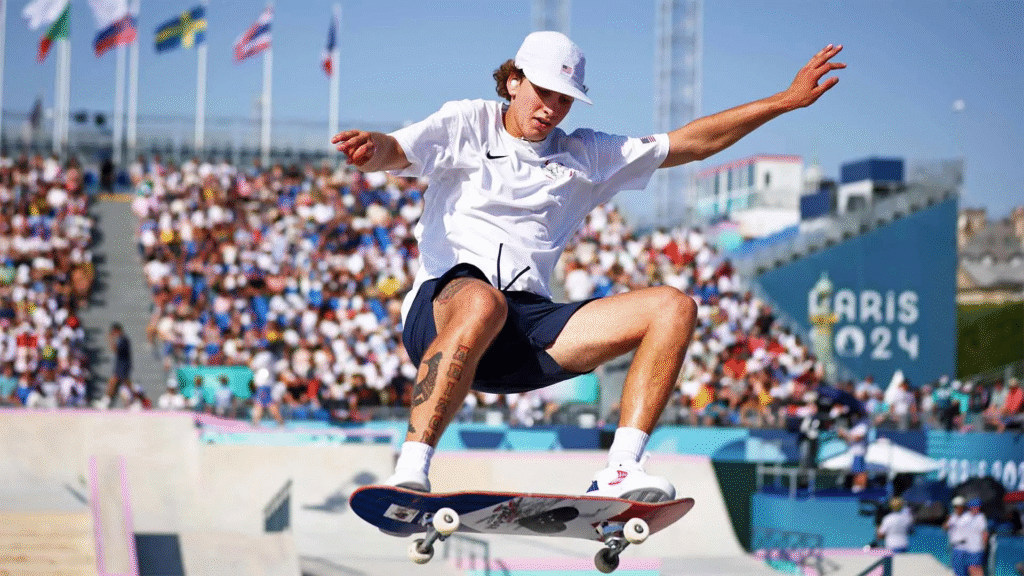
Yuto Horigome’s gold for Japan: A historic start for skateboarding Olympics
The Skateboarding Olympic Games officially launched at the Tokyo 2020 Summer Games, marking the beginning of a new era for the sport on the world stage. This historic inclusion marked an important milestone not only for professional skateboarders but for an entire culture rooted in creativity, freedom, and individuality. Recognizing the sport’s growing popularity among young people, the International Olympic Committee (IOC) welcomed skateboarding as part of its mission to modernize the Games and connect with a younger, more diverse audience.
With the introduction of skateboarding, the Olympic Games marked a bold shift toward embracing urban sports and alternative expressions of athletic excellence. The energy and authenticity that skateboarding brought to the Olympic Games distinguish it as one of the most exciting additions to modern sports.
One of the most special moments of this debut was Yuto Horigome’s gold medal victory in the men’s street competition. Competing in his home country of Japan, Horigome delivered a flawless and stylish performance, making history as the first Olympic Skateboarding gold medalist. His victory not only symbolizes pride in his hometown but also marks the beginning of a new legacy for the sport worldwide.
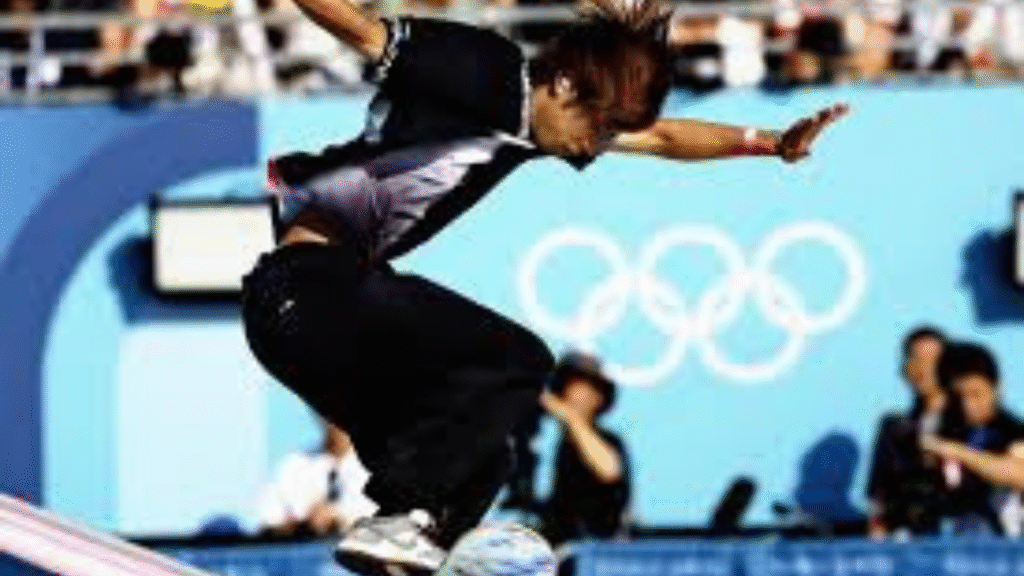
Hometown hero makes history.
On July 25, 2021, Yuto Horigome made history at the Skateboarding Olympics by becoming the first Olympic gold medalist in the sport. Competing in the men’s street event, he delivered a masterful performance for his home crowd in Tokyo, showcasing complex tricks with remarkable precision and style. His victory represented not just a personal milestone but a moment of national pride as well. Growing up in Japan and skating the streets of Tokyo, Horigome’s gold medal win on home soil symbolized the significant journey of both his career and the sport of skateboarding.
His victory was more than just a personal achievement – it was a moment of national pride. Born and raised in Japan, Horigome grew up skating the streets of Tokyo, and his gold medal win on home soil was a powerful symbol of how far both he and the sport have come.
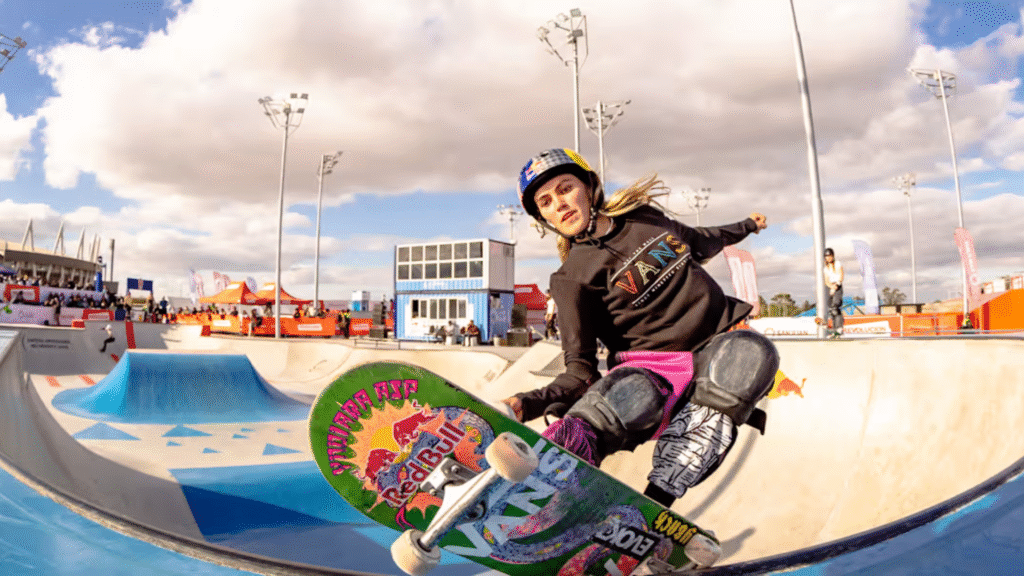
A global statement for skateboarding
Yuto Horigome’s win was a defining moment not just for Japan but for the global skateboarding community. It marked the beginning of a new chapter – one in which street skaters from humble beginnings can reach Olympic glory. His win recognized skateboarding as a legitimate sport in the eyes of millions, while also maintaining its soul and street credibility.
For aspiring skaters around the world, especially in countries where skateboarding is still emerging, Horigome’s win was inspirational. It showed that dedication, passion, and authenticity can lead to the Olympic podium, even in a sport that has long been considered outside the mainstream.
Momiji Nishiya: 13-year-old gold medallist in Women’s Street
One of the most unforgettable moments of the skateboarding Olympics debut at Tokyo 2020 was the incredible performance of 13-year-old skater Momiji Nishiya, who won gold in the Women’s Street event. Her stunning victory made her the youngest Olympic gold medallist in Japan’s history and the youngest champion in the history of the Games.
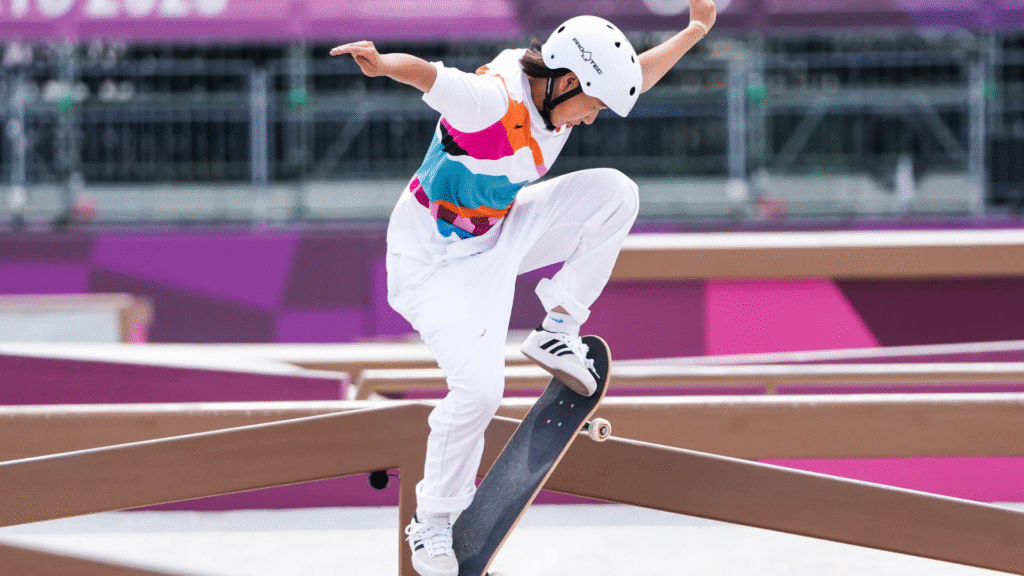
A star is born on the global stage.
Momiji Nishiya’s Olympic Skateboarding Performance: A Historic Moment of Youth and Excellence
Momiji Nishiya’s Olympic skateboarding performance was a brilliant demonstration of technical skill, poise, and youthful energy. At just 13 years old, she executed difficult tricks with poise and precision, displaying a maturity far beyond her years. Despite competing against some of the best female skaters in the world, Momiji remained focused and fearless, ultimately achieving the gold medal in the women’s street competition.
Her victory was more than a personal achievement: it was a defining moment for young athletes in the sport. Momiji Nishiya’s skateboarding triumph sent a powerful message: talent, determination, and passion matter more than age or gender. In a sport historically dominated by men, her gold medal challenged entrenched stereotypes and opened the door to a new generation of young people who dream of skating at the world level.
Momiji’s success not only elevated her to the status of a role model but also helped redefine what’s possible in Olympic skateboarding. Her triumph is a symbol of change, progress, and inspiration for aspiring athletes around the world.
Inspiring the world with youthfulness and determination
The feat of a 13-year-old girl conquering the world’s biggest athletic stage instantly captured the attention of a global audience. Media outlets, social platforms, and fans around the world celebrated her as a symbol of determination, courage, and youthful inspiration. Her happy smile, humble attitude, and fearless performance made her a standout star of the Tokyo Games.
More than just a medal, Momiji Nishiya’s victory at the Skateboarding Olympics reminded us that the future of sports lies in embracing young talent and breaking traditional boundaries. Her story inspired countless children, especially young girls, to pick up a skateboard and believe in their potential.
Resa Leal’s silver medal for Brazil: A viral star shines on the Olympic stage
At just 13 years old, Brazil’s Rayssa Leal captured the hearts of millions during the Skateboarding Olympics at the Tokyo 2020 Games, where she won a silver medal in the women’s street skateboarding event. Her impressive performance and lively energy not only secured her a spot on the podium but also made her one of the most talked-about athletes of the Olympics.
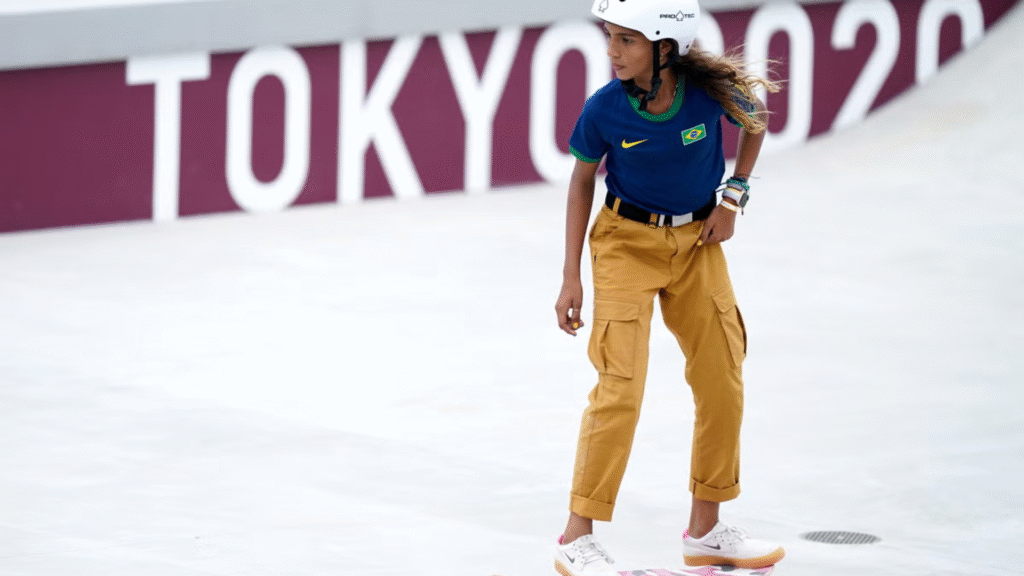
From internet sensation to Olympic hero
Ressa’s journey to Olympic stardom began years before Tokyo. At age 7, she captured worldwide attention when a video of her performing tricks in a fairy costume went viral. Known as the “Angel of Skateboarding,” Ressa soon became a symbol of the fun, passion, and youthful potential of the sport. Fast forward to 2021, the once-viral star has evolved into a world-class competitor on the world’s biggest stage.
Her performance at the Skateboarding Olympics was a showcase of style, composure, and technical skill. Despite her young age, she performed her tricks with precision and confidence, beating many seasoned competitors. The silver medal she won was a testament to years of hard work and a fearless attitude.
A global sensation and social media icon
Ressa’s Olympic success sent social media into a frenzy, with fans, athletes, and celebrities around the world celebrating her achievement. Her personality – playful, positive, and humble – transcended borders and generations. Photos of her smiling, dancing, and supporting her fellow competitors went viral, making her an instant global icon.
Her story highlighted the unique spirit of the Skateboarding Olympics, where camaraderie and joy were just as important as competition. In a sport based on community and self-expression, Ressa emerged as the embodiment of skateboarding’s vibrant culture.
Inspiring a new era for Brazilian and Latin American skateboarding
Ressa Leal’s impact at the Skateboarding Olympics: A proud moment for Brazil and Latin America
Ressa Leal’s silver medal at the Skateboarding Olympics was a historic milestone for Brazil and Latin America, regions where skateboarding has long had deep cultural roots, yet has been underrepresented at global competitions. Her remarkable performance on the Olympic stage brought widespread recognition to the sport across the continent, sparking investment, participation, and pride in local skateboarding communities.
In Brazil, Ressa became a national sensation overnight. Her stunning debut at the Skateboarding Olympics won hearts and created a new wave of excitement among young skaters, especially girls. More than an athlete, she emerged as a role model, proving that with talent, passion, and a little fairy dust, dreams can come true.
Her legacy goes far beyond the silver medal; it lies in the doors she opened and the dreams she inspired, which helped shape the future of skateboarding not just in Brazil but throughout Latin America.
Skye Brown wins bronze for Great Britain: A story of courage and comeback
Skye Brown’s historic bronze at the Skateboarding Olympics
At the 2020 Tokyo Games, 13-year-old Skye Brown etched her name in the history books by winning a bronze medal in the women’s park event at the Skateboarding Olympics. With this achievement, she became Great Britain’s youngest Olympic medallist, garnering global attention not just for her age but for her exceptional skill, spirit, and determination.
Skye’s remarkable performance was more than just a podium finish – it was a story of resilience and inspiration. Overcoming a serious injury before the Games, she made a stunning comeback to compete at the highest level. Her journey to the Skateboarding Olympics has made her one of the sport’s most iconic figures, symbolising courage, youthful passion, and the limitless possibilities of this new Olympic discipline.
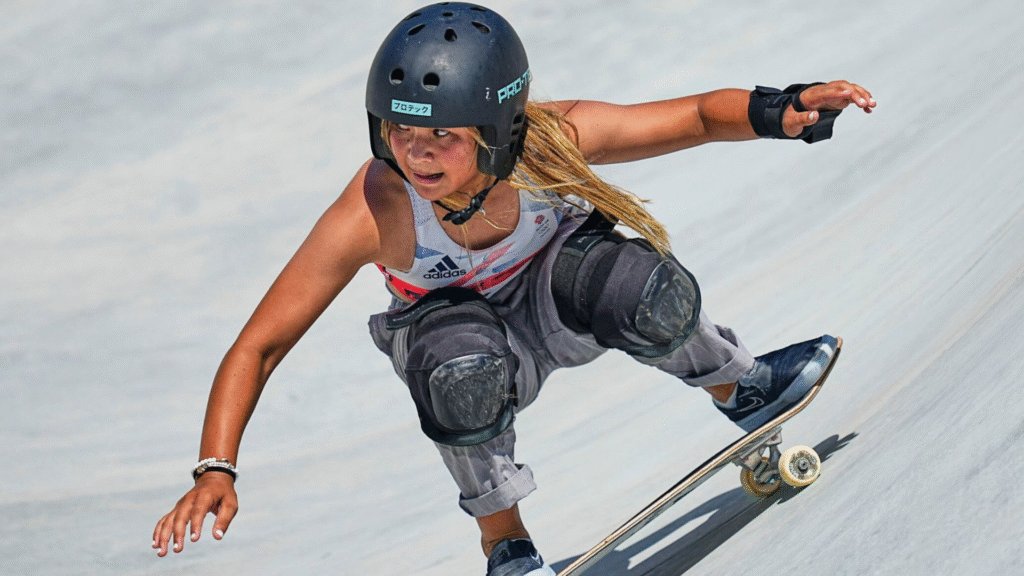
A Historic Achievement for Team GB
Skye Brown’s bronze medal at the Skateboarding Olympics: A groundbreaking moment for British sport
Skye Brown’s bronze medal at the Skateboarding Olympics was more than just a podium finish – it was a groundbreaking moment in British sporting history. As the youngest athlete to represent Team GB at the Summer Olympics, her incredible achievement marked the start of a new chapter for young athletes entering elite competition. Her fearless skating and creative talent astounded the judges and captivated fans around the world, proving that talent and confidence can shine through at any age.
Skye’s performance at the Skateboarding Olympics was a stunning display of fluidity, technical difficulty, and expressive style. Competing against the world’s top skaters, she remained calm under pressure and delivered a near-perfect run. Her efforts didn’t just earn her a medal – they earned her a permanent place in Olympic history and inspired a generation of young skaters around the world.

Remarkable Return from Injury
What made Sky Brown’s Olympic journey even more extraordinary was her comeback just a year before the Games. In 2020, she suffered a life-threatening fall during training that left her with a skull fracture, broken bones, and a lengthy recovery time. Many feared she would never be able to skate again, let alone compete at the Olympic level.
But Sky’s courage was unwavering. With grit, determination, and an unquenchable love for skateboarding, she made a full recovery and returned stronger than ever. Her resilience became a source of inspiration for athletes and all those who face adversity.
A symbol of courage, youth, and passion.
Sky Brown’s story goes beyond sport. She embodies the essence of the Skateboarding Olympics: a celebration of individuality, creativity, and inner strength. Her presence on the podium wasn’t just about medals; it was about the power of believing in yourself, even in the face of fear and doubt.
For young girls, aspiring skaters, and fans worldwide, Skye is more than a champion: she’s a symbol of youthful courage, determination, and hope. Her bronze medal reminds us that with passion and perseverance, even the biggest dreams can become reality.
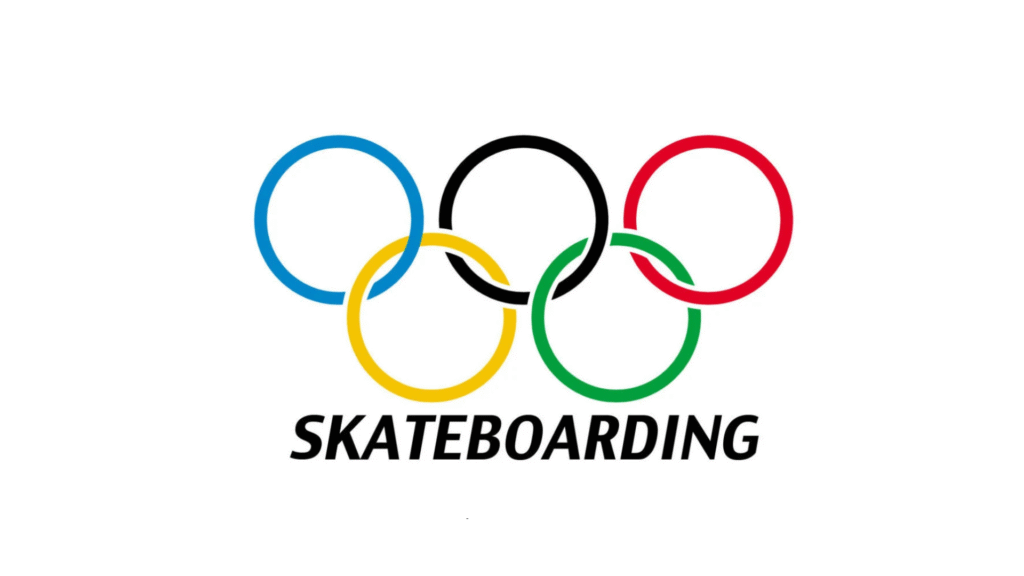
Keegan Palmer dominated the men’s park skateboarding final: a performance for the ages that earned him gold.
Keegan Palmer shines in Tokyo: Australia’s golden moment at the Skateboarding Olympics.
Skateboarding got off to a thrilling start at the Tokyo 2020 Olympic Games, capturing the hearts of fans around the world with gravity-defying tricks, youthful energy, and unrivalled creativity. Among the standout performances, one name stood out – Keegan Palmer, who won the inaugural men’s park skateboarding gold medal spectacularly.
A historic first for skateboarding and Australia
Making its debut at the Olympics, skateboarding was divided into two disciplines – street and park. The men’s park final, held at Ariake Urban Sports Park in Tokyo, featured some of the most talented riders from around the world. Among them, Australia’s Keegan Palmer, who was just 18 years old at the time, produced several spectacular runs that earned him a place in history.
Palmer’s best run was an incredible 95.83, putting him well ahead of his rivals. His performance was a perfect blend of difficulty, creativity, style, and consistency – key elements in the scoring criteria. With huge airs, intricate tricks, and a seamless flow through the park, Palmer left no doubt about who deserved the gold medal.
A star is born
Palmer’s gold was not only Australia’s first medal at the skateboarding Olympics, but also a statement that the nation is a force to be reckoned with in this new Olympic sport. His performance was lauded by fans and commentators alike, many of whom highlighted his confidence, smooth transitions, and ability to perform high-risk tricks under immense pressure.
What made Palmer’s win even more special was his maturity and humility. After securing the top spot, he celebrated by paying tribute to his fellow competitors and emphasising the camaraderie within the skateboarding community.
The global impact of the Skateboarding Olympics
The inclusion of skateboarding in the Olympics was a game-changer for the sport. It provided a global platform for skaters to showcase their talents and break stereotypes. The Skateboarding Olympics at Tokyo 2020 attracted millions of viewers and inspired a new generation of skaters around the world.
Keegan Palmer’s golden performance has already become a defining moment in Olympic history. It symbolises more than just individual success – it represents skateboarding’s evolution from street culture to a respected Olympic sport.
Looking ahead
As skateboarding continues to grow within the Olympic movement, all eyes will be on the next generation of athletes. Palmer, now a household name in Australia and a global ambassador for the sport, is expected to remain a top contender at future competitions, including the Paris 2024 Olympics.
His Tokyo 2020 performance set a new standard for excellence and opened the door for skateboarders around the world to dream of Olympic glory.
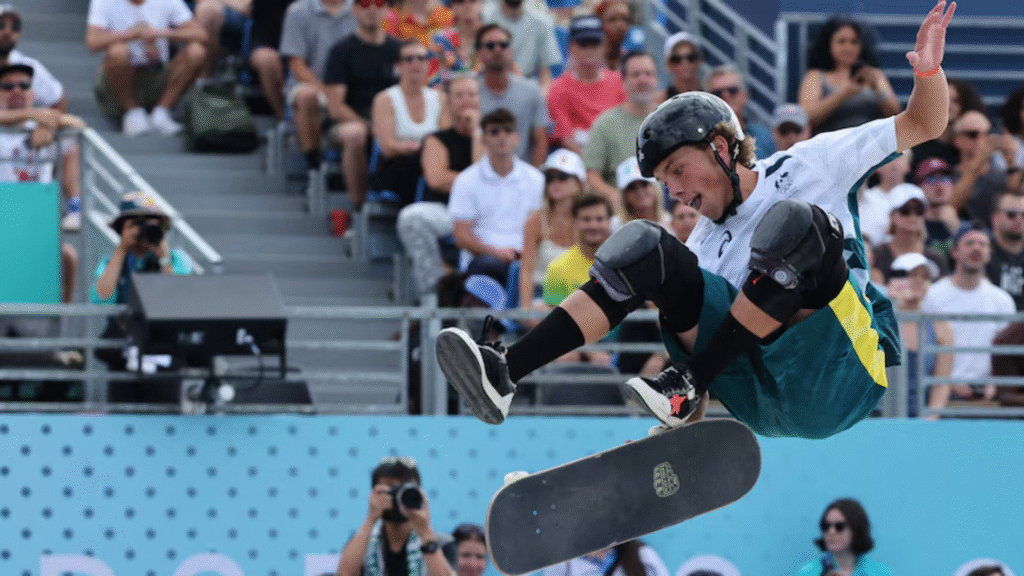
A masterclass in precision and difficulty.
Keegan Palmer Delivers a Masterclass at the Skateboarding Olympics
The moment Keegan Palmer stepped into the bowl, it was clear that something special was going to happen at the Skateboarding Olympics. His run was a stunning display of skateboarding artistry, defined by clean lines, flawless transitions, and impressive aerodynamics. Palmer navigated the course with exceptional fluidity, utilizing every inch of the park to its full potential.
What set him apart was his ability to execute highly technical tricks with effortless control. Spectators and judges were mesmerized by his flawless 540s, smooth frontside ollies, and beautiful grinds – all performed with precision and confidence. Each trick flowed seamlessly into the next, creating a routine that was not only difficult but also artistically appealing.
Palmer’s final score was a reflection of both the technical complexity and the creativity he brought to the event. His performance embodied the spirit of park skating and raised the bar for athletes in future Skateboarding Olympics. This wasn’t just a gold medal race — it was a defining moment that showcased the beauty and athleticism of Olympic-level skateboarding.
Historic Moment for Australia
Australia celebrates Keegan Palmer’s historic win at the Skateboarding Olympics.
Keegan Palmer’s gold medal at the Skateboarding Olympics was a monumental moment for Australia, giving the country its first Olympic medal in the sport. His stunning performance not only thrilled local fans but also drew global attention to Australia’s rapidly growing skateboarding community.
Palmer’s win wasn’t just personal – it was a celebration of the sport’s growing popularity in Australia. His achievement demonstrated the country’s ability to compete at the highest level in Olympic skateboarding and inspired a new generation of young skaters.
The win also emphasised the international appeal of the Skateboarding Olympics, which unite elite talent from all corners of the globe. Palmer’s success served as a powerful reminder that skateboarding transcends borders, cultures, and backgrounds.
His gold medal became a symbol of pride for both his country and the global skateboarding community, reinforcing the message that skateboarding is a truly universal sport – one that thrives on passion, creativity, and worldwide inclusion.
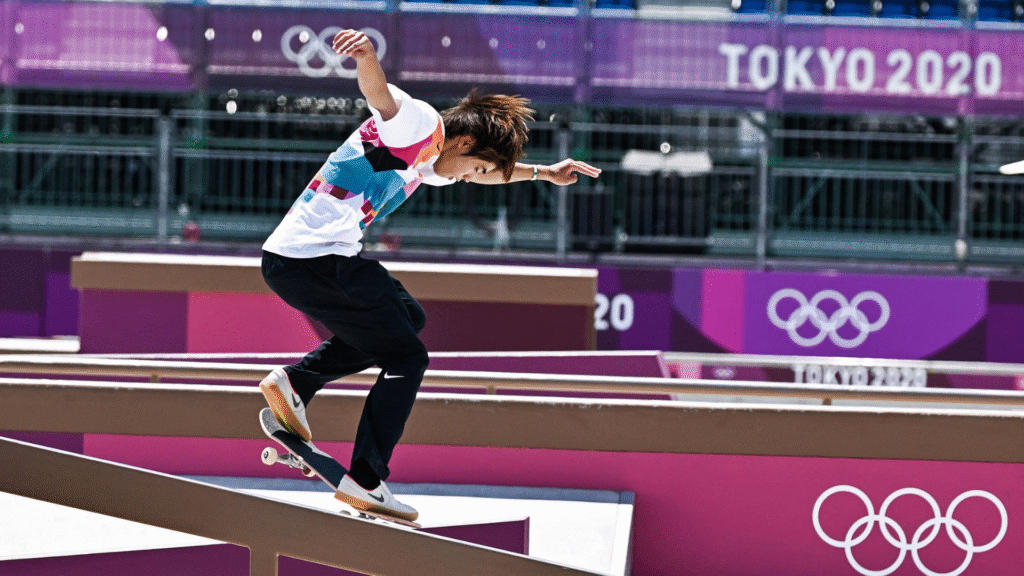
A Standout Performance in Olympic Skateboarding History
Keegan Palmer’s spectacular performance in skateboarding at the Olympics
Keegan Palmer’s gold medal at the Skateboarding Olympics wasn’t just worthy of the podium – it was worthy of a place in skateboarding history. With his calm demeanor under tremendous pressure, exceptional technical skill, and test of spirit, his performance created one of the sport’s most iconic performances at the Olympic Games. It was a performance that inquisitive skaters studied and emulated for the next several years.
In a discipline where style is just as important as skill, Palmer portrayed the two in perfect harmony. His effortless transitions, bold trick choices, and artistic flair set a new standard for excellence on the Olympic stage.
Palmer’s stunning victory in the Men’s Park finals marked the perfect finale to the first-ever Skating Olympics – an event that embodied the energy, courage, and innovation of youth culture. His performance not only underscored the competition but also symbolized skateboarding’s potential as a global Olympic sport.
Skateboarding Spirit: Athletes Support Each Other
Skateboarding Olympics highlight sportsmanship and a sense of community
One of the most heartwarming and defining elements of the Skateboarding Olympics at Tokyo 2020 wasn’t just the high-flying tricks or historic medal wins – it was the extraordinary display of sportsmanship and unity amongst the athletes.
Unlike many traditional Olympic events, the skateboarding competitions introduced a refreshing culture of mutual respect, support, and celebration. Skaters cheered each other on after every race, hugged after a fall, and celebrated each other’s wins as if they were their own. This sense of brotherhood made the Skateboarding Olympics more than just a competition – it became a global celebration of community, creativity, and shared passion.
The Tokyo 2020 Games reminded the world that skateboarding isn’t just about winning; it’s about lifting others, embracing individuality, and pushing the boundaries of what’s possible – together.
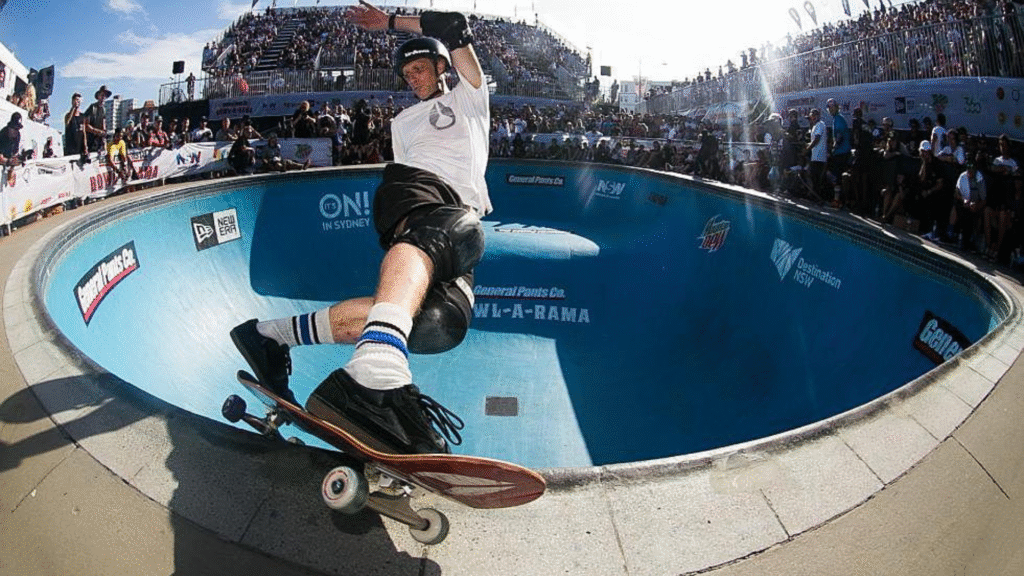
Celebrating Each Other’s Success
Skateboarding Olympics showcase unique camaraderie and culture.
During the 2020 Tokyo Skateboarding Olympic Games, fans witnessed a camaraderie rarely seen in competitive sports. Skaters not only focused on their performance, but also actively encouraged their teammates. Whether in a street race or an ark, athletes were seen hugging after long races, helping each other up after falls, and celebrating their successes together, regardless of their nationality, ranking, or medal prospects.
This collective spirit was most evident during attempts at the most difficult tricks. In place of silence or tense rivalries, cheers, smiles, and encouragement swept through the skateboarding community. Raised fists, cheers, and genuine excitement became commonplace, demonstrating that each successful trick was celebrated as a shared victory.
Moments like these defined the Skateboarding Olympics as much more than just a competition: they highlighted a culture based on mutual respect, support, and a love of the sport. Skateboarding has proven that unity and community are just as important as athletic achievement, even on the world’s biggest stage.
More Than a Competition
Skateboarding has always been more than a sport: it’s a lifestyle built on community, creativity, and support. The Olympic debut preserved this core identity. Even on the world’s biggest sporting stage, the skaters stayed true to their roots and showed that competing hard doesn’t mean losing kindness.
From young stars like Ressa Leal and Sky Brown supporting each other during races to seasoned pros offering advice and encouragement, the Skateboarding Olympics demonstrated what it truly means to support one another. These athletes weren’t just looking to win a gold medal: they were sharing a collective moment celebrating their love of skateboarding.
Setting a New Standard for Olympic Spirit
In many ways, the Skateboarding Olympics redefined sportsmanship. The lack of ego, the emphasis on mutual respect, and the genuine joy shared among competitors stood in stark contrast to the high-pressure atmosphere seen at other Olympic Games.
This refreshing display of unity and support inspired audiences around the world and highlighted why skateboarding is so special. It wasn’t just a demonstration of physical talent: it was a powerful reminder that true greatness involves humility, empathy, and heart.
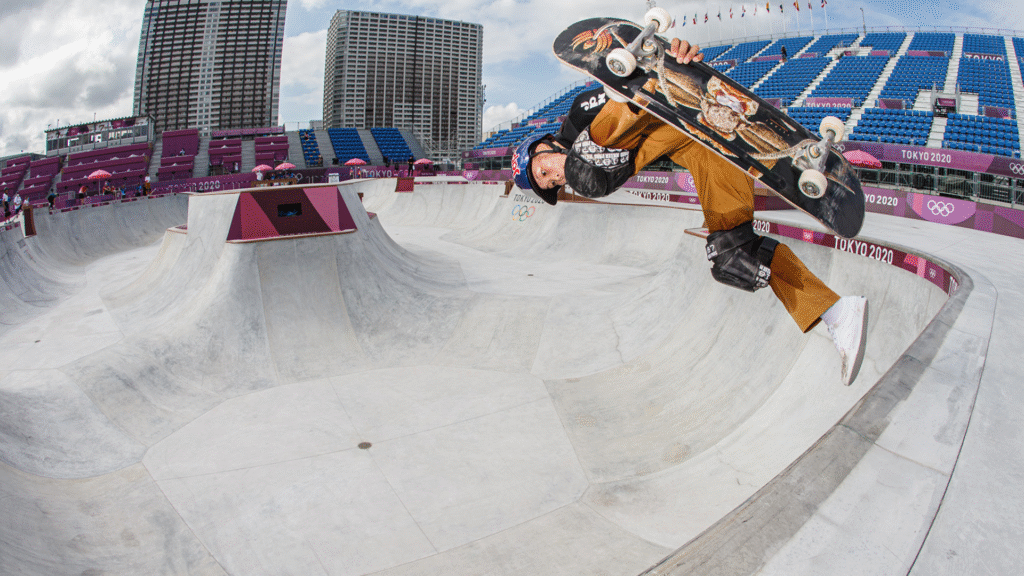
Global Representation and Diversity in Sport
Skateboarding Olympics highlight diversity and global unity
Skateboarding’s debut at the Olympic Games was a historic moment, not only because of its high athleticism but also because of its powerful message of unity and inclusion. At the 2020 Tokyo Skateboarding Olympics, one of the most notable features was the diversity of participants and medalists.
Athletes from different countries, age groups, and cultural backgrounds gathered, highlighting skateboarding’s global popularity. From teenagers to seasoned professionals, skaters demonstrated that the sport transcends borders and speaks a universal language of creativity, freedom, and community.
This diversity not only reflects who competes in skateboarding, but it is also a testament to the sport’s ability to unite people of all generations and geographies. The Skateboarding Olympics made it clear that skateboarding is more than a sport; it is a global movement based on inclusivity, passion, and shared respect.
A Truly International Platform
Skateboarding Olympics are a global phenomenon.
Unlike many Olympic Games that have traditionally been dominated by a handful of countries, the 2020 Skateboarding Olympics showcased a refreshing and diverse mix of champions. Athletes from countries such as Japan, Brazil, the United Kingdom, and Australia won medals, highlighting the sport’s greater influence.
This wide geographical spread of winners highlights how skateboarding has become the language of youth. Far from being limited to specific regions, the sport is now being embraced by enthusiastic communities worldwide.
Each medalist brought their own unique style and cultural influence to the competition, enriching the event and proving that elite skateboarding talent can emerge from anywhere. The Skateboarding Olympics have also shown a powerful impact. The sport isn’t just for traditional heavyweights – it’s for everyone, everywhere.

Diversity in Age, Gender, and Culture
The Skateboarding Olympics also stood out for the diversity of its athletes. From talented 13-year-olds like Momiji Nishiya, Ressa Leal, and Sky Brown to seasoned veterans, the event showcased a wide age range, with young newcomers and experienced skaters competing side by side.
Furthermore, the strong representation of female athletes in both street and park categories was a bold step toward gender equality in action sports. These women not only competed at the highest level but also inspired countless others with their skills, confidence, and presence on the world stage.
The inclusive and non-traditional roots of skateboarding were evident throughout the Games, as athletes from diverse ethnicities, social backgrounds, and life paths came together to celebrate a shared passion. It was a powerful reminder that talent has no limits and skateboarding offers a space where individuality thrives.
Breaking Stereotypes and Redefining Norms
Entering the Olympic stage helped skateboarding break deep-rooted stereotypes. Once considered a sport belonging to a rebellious or marginal subculture, it is now recognized for what it is: a disciplined, creative, and even athletic activity that requires enormous skill and dedication.
The Skateboarding Olympics challenged the norms of Olympic sports. As athletes expressed their freedom, supported one another, and celebrated diversity, the event redefined not only who could be an Olympian but also what it meant to be one.
Skateboarding Olympics Legacy
The inclusion of skateboarding in the Tokyo 2020 Olympic Games is a historic moment, not only for the sport but for the Olympic Games themselves. With its vibrant energy, young stars, and global diversity, skateboarding brought a fresh and dynamic spirit to the Olympic Games. Its legacy is already taking shape, influencing youth culture, shaping future Olympic events, and fueling interest in skateboarding around the world.
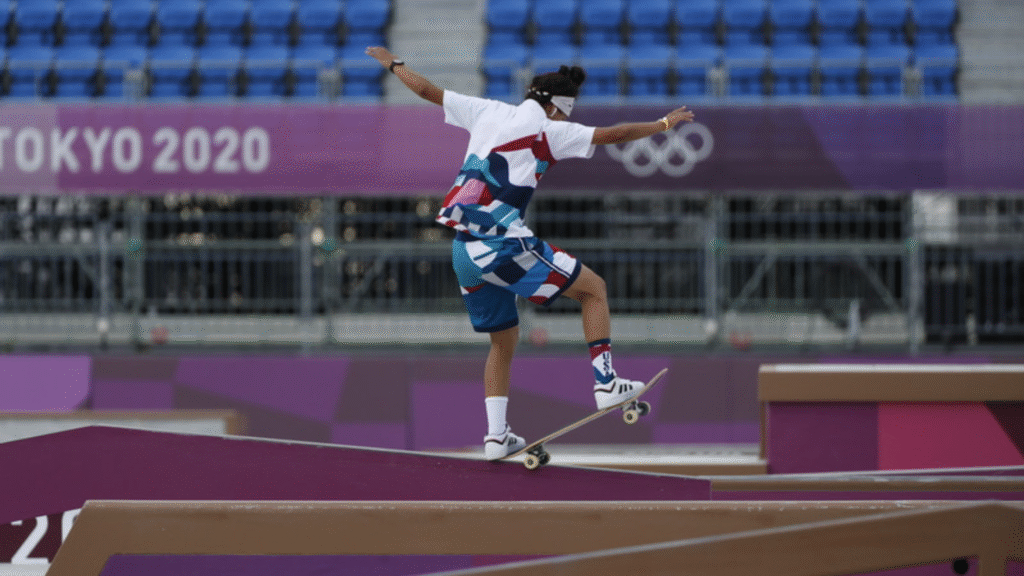
Powerful Influence on Youth Culture
The Skateboarding Olympics profoundly impacted young audiences, featuring athletes who were not only highly skilled but also spontaneous, expressive, and authentic. Teenagers around the world saw themselves reflected in young medalists like Ressa Leal, Momiji Nishiya, and Sky Brown, proving that the next generation doesn’t have to wait to make history.
The event also blurred the lines between sport and art, placing street culture, fashion, music, and personality in the Olympic spotlight. This connection with youth culture revitalized the Games and made them more accessible and appealing to new audiences who didn’t normally follow traditional sports.
Skateboarding’s Global Rise in Popularity
Skateboarding Olympics Spark Global Boom in Popularity and Investment
Following its debut at the Olympic Games, skateboarding’s popularity has grown worldwide. The Skateboarding Olympics sparked a wave of enthusiasm, generating crowds at skate parks, increasing youth participation, and renewed investment in skateboarding programs by countries eager to embrace the sport’s growing influence.
Countries that once ignored skateboarding now recognize its immense potential, not only as a medal-winning discipline but also as a powerful tool for community development, youth engagement, and cultural exchange. The global visibility provided by the Skateboarding Olympics played a significant role in shifting public perception, transforming the sport from an elite subculture to a respected Olympic discipline.
Brands, local governments, and sports organizations are now capitalizing on this momentum, ensuring that skateboarding continues to thrive as a competitive sport and a vibrant global movement. A long-standing stigma prevents skateboarding as a serious, disciplined, and inclusive sport.
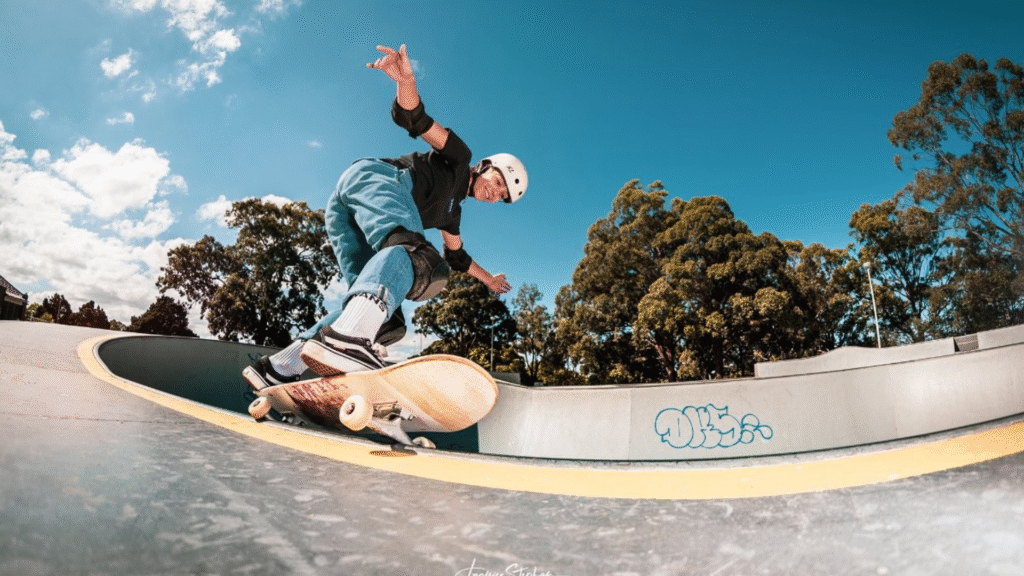
What to Expect from Paris 2024 and Beyond
Skateboarding Will Take the Olympic Stage Even Higher at Paris 2024
As the Paris 2024 Olympic Games approach, Olympic skateboarding is poised to reach new heights. As the sport continues to evolve, fans can expect more sophisticated competition formats, broader athlete visibility, and greater global participation, all of which promise even greater levels of performance and creativity.
The inclusion of urban sports such as skateboarding, sport climbing, and breakdancing reflects the International Olympic Committee’s commitment to modernizing the Games and attracting a younger, more diverse audience. Skateboarding has proven its value as a competitive and cultural force, especially on the Olympic stage.
Looking ahead, the skateboarding Olympic Games are expected to feature rising stars, innovative tricks, and increased youth participation. What began as a bold debut in Tokyo has become a growing legacy that will continue to influence not only Olympic sport but global youth culture for generations to come. Skateboarding Will Take the Olympic Stage Even Higher at Paris 2024
As the Paris 2024 Olympic Games approach, Olympic skateboarding is poised to reach new heights. As the sport continues to evolve, fans can expect more sophisticated competition formats, broader athlete visibility, and greater global participation, all of which promise even greater levels of performance and creativity.
The inclusion of urban sports such as skateboarding, sport climbing, and breakdancing reflects the International Olympic Committee’s commitment to modernizing the Games and attracting a younger, more diverse audience. Skateboarding has proven its value as a competitive and cultural force, especially on the Olympic stage.
Looking ahead, the Skateboarding Olympic Games are expected to feature rising stars, innovative tricks, and increased youth participation. What began as a bold debut in Tokyo has become a growing legacy that will continue to influence not only Olympic sport but global youth culture for generations to come.
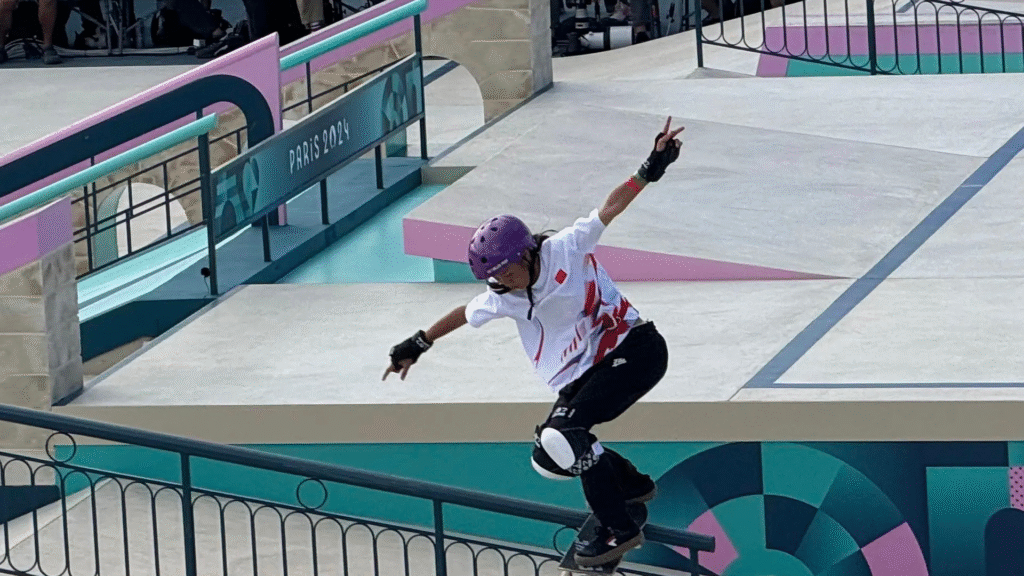
Conclusion
Skateboarding Olympics debut at Tokyo 2020 delivered a series of unforgettable moments that not only highlighted raw talent and creativity but also showcased the heart and spirit of a sport rooted in freedom and community. From Yuto Horigome’s historic gold medal for Japan to Sky Brown’s inspirational comeback, and from Ressa Leal’s viral rise to the massive display of sportsmanship and unity, these stories have earned a permanent place in Olympic history.
Read More in Duniya Sports
Content Source www.olympics.com/en/sports/skateboarding

